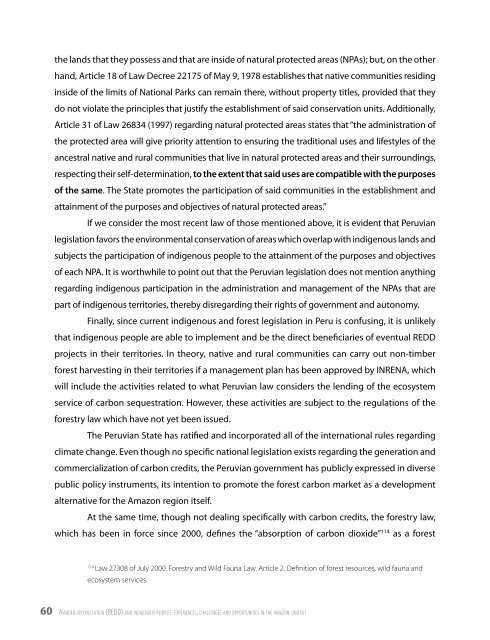Avoided Deforestation (REDD) and Indigenous ... - Amazon Fund
Avoided Deforestation (REDD) and Indigenous ... - Amazon Fund
Avoided Deforestation (REDD) and Indigenous ... - Amazon Fund
You also want an ePaper? Increase the reach of your titles
YUMPU automatically turns print PDFs into web optimized ePapers that Google loves.
the l<strong>and</strong>s that they possess <strong>and</strong> that are inside of natural protected areas (NPAs); but, on the other<br />
h<strong>and</strong>, Article 18 of Law Decree 22175 of May 9, 1978 establishes that native communities residing<br />
inside of the limits of National Parks can remain there, without property titles, provided that they<br />
do not violate the principles that justify the establishment of said conservation units. Additionally,<br />
Article 31 of Law 26834 (1997) regarding natural protected areas states that “the administration of<br />
the protected area will give priority attention to ensuring the traditional uses <strong>and</strong> lifestyles of the<br />
ancestral native <strong>and</strong> rural communities that live in natural protected areas <strong>and</strong> their surroundings,<br />
respecting their self-determination, to the extent that said uses are compatible with the purposes<br />
of the same. The State promotes the participation of said communities in the establishment <strong>and</strong><br />
attainment of the purposes <strong>and</strong> objectives of natural protected areas.”<br />
If we consider the most recent law of those mentioned above, it is evident that Peruvian<br />
legislation favors the environmental conservation of areas which overlap with indigenous l<strong>and</strong>s <strong>and</strong><br />
subjects the participation of indigenous people to the attainment of the purposes <strong>and</strong> objectives<br />
of each NPA. It is worthwhile to point out that the Peruvian legislation does not mention anything<br />
regarding indigenous participation in the administration <strong>and</strong> management of the NPAs that are<br />
part of indigenous territories, thereby disregarding their rights of government <strong>and</strong> autonomy.<br />
Finally, since current indigenous <strong>and</strong> forest legislation in Peru is confusing, it is unlikely<br />
that indigenous people are able to implement <strong>and</strong> be the direct beneficiaries of eventual <strong>REDD</strong><br />
projects in their territories. In theory, native <strong>and</strong> rural communities can carry out non-timber<br />
forest harvesting in their territories if a management plan has been approved by INRENA, which<br />
will include the activities related to what Peruvian law considers the lending of the ecosystem<br />
service of carbon sequestration. However, these activities are subject to the regulations of the<br />
forestry law which have not yet been issued.<br />
The Peruvian State has ratified <strong>and</strong> incorporated all of the international rules regarding<br />
climate change. Even though no specific national legislation exists regarding the generation <strong>and</strong><br />
commercialization of carbon credits, the Peruvian government has publicly expressed in diverse<br />
public policy instruments, its intention to promote the forest carbon market as a development<br />
alternative for the <strong>Amazon</strong> region itself.<br />
At the same time, though not dealing specifically with carbon credits, the forestry law,<br />
which has been in force since 2000, defines the “absorption of carbon dioxide” 114 as a forest<br />
114 Law 27308 of July 2000. Forestry <strong>and</strong> Wild Fauna Law. Article 2. Definition of forest resources, wild fauna <strong>and</strong><br />
ecosystem services.<br />
60 Av o i d e d d e f o re s t A t i o n (redd) A n d i n d i g e n o u s p e o p l e s: experiences, chAllenges A n d o p p o r t u n i t i e s in t h e A m A zo n c o n t e x t
















